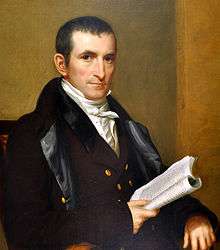Elijah Brush
| Elijah Brush | |
|---|---|
 | |
| 2nd Mayor of Detroit, first charter | |
|
In office 1806–1806 | |
| Preceded by | Solomon Sibley |
| Succeeded by | None; reincorporated |
| Personal details | |
| Born |
c. 1772 Bennington, Vermont |
| Died |
December 14, 1813 (aged 40–41) Detroit, Michigan |
| Spouse(s) | Adelaide Askin |
| Alma mater | Dartmouth College |
| Profession | Lawyer |
Elijah Brush (c. 1772 – 1813) was a lawyer and politician from Detroit, Michigan.
Early life
Elijah Brush was born in Bennington, Vermont in approximately 1772, the son of Colonel Nathaniel Brish and Samantha Parker.[1] Brush graduated from Dartmouth College and came to Detroit in 1798.[2]
Brush married Adelaide Askin (c. 1779 – 1859),[1] daughter of John Askin, in 1802.[2] The couple had three sons and a daughter[3] who survived their father: Edmund Askin (b. 1802), Charles Reuben (b. 1807), John Alfred (b. 1811), and Archange (b. 1813).[1] John Askin was a British subject, and when Detroit was turned over to American control, he moved across the Detroit River to Canada, leaving behind his farm, "Private Claim #1," which was immediately adjacent to Detroit.[1]
Elijah and Adelaide moved onto her father's farm, and in 1806 the Brushes purchased it for $6000; the property eventually became known as the Brush Farm.[1] With careful administration, Brush increased the value of the farm and made his heirs wealthy.[2] In particular, in the 1850s, Edmund Brush began developing sections of the property into the fashionable Brush Park; the street names Edmund, Alfred, Adelaide, and Brush were named by Edmund after family members.[4]
Public service
Elijah Brush was elected a trustee in 1803, appointed Lieutenant Colonel of the Territorial Militia in 1805, and appointed as mayor of the town of Detroit after Solomon Sibley's resignation in 1806.[2] Brush also served as Treasurer of the Michigan Territory from 1806 to 1813, and from 1811 to 1814 served as United States Attorney.[3]
Brush was the counsel in the first case to test the right to hold slaves in Michigan.[5]
During the War of 1812, British forces captured Detroit and Elijah Brush and other militia officers were taken prisoner.[2] He was shipped to Toronto, but his brother-in-law, a British officer, procured his release, and Brush returned to Detroit in late 1813[6] when American troops retook the city.[2] He died shortly thereafter on December 14, 1813.[2][6]
| Political offices | ||
|---|---|---|
| Preceded by Solomon Sibley |
Mayor of Detroit 1806 |
Succeeded by Re-incorporation |
References
- 1 2 3 4 5 Judy Jacobson (2002), Detroit River Connections: Historical and Biographical Sketches of the Eastern Great Lakes Border Region, Genealogical Publishing Com, pp. 58–63, ISBN 0-8063-4510-1
- 1 2 3 4 5 6 7 The government of the city of Detroit and Wayne County, Michigan: 1701 to 1907, historical and biographical, 1907, pp. 26–27
- 1 2 "Elijah Brush". History of Detroit.com. Retrieved September 7, 2010.
- ↑ Ren Farley. "Brush Park Historic District/Woodward East Historic District". Detroit1701.org. Retrieved September 7, 2010.
- ↑ Stephen D. Bingham (1888), Early history of Michigan: with biographies of state officers, members of Congress, judges and legislators, Thorp & Godfrey, state printers, p. 134
- 1 2 "Elijah Brush". Elmwood Cemetery. Retrieved September 7, 2010.